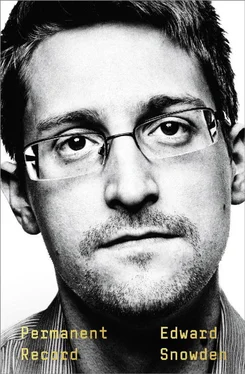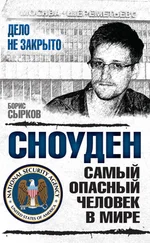The constitutional system only functions as a whole if and when each of its three branches works as intended. When all three don’t just fail, but fail deliberately and with coordination, the result is a culture of impunity. I realized that I was crazy to have imagined that the Supreme Court, or Congress, or President Obama, seeking to distance his administration from President George W. Bush’s, would ever hold the IC legally responsible—for anything. It was time to face the fact that the IC believed themselves above the law, and given how broken the process was, they were right. The IC had come to understand the rules of our system better than the people who had created it, and they used that knowledge to their advantage.
They’d hacked the Constitution.
* * *
AMERICA WAS BORN from an act of treason. The Declaration of Independence was an outrageous violation of the laws of England and yet the fullest expression of what the Founders called the “Laws of Nature,” among which was the right to defy the powers of the day and rebel on point of principle, according to the dictates of one’s conscience. The first Americans to exercise this right, the first “whistleblowers” in American history, appeared one year later—in 1777.
These men, like so many of the men in my family, were sailors, officers of the Continental Navy who, in defense of their new land, had taken to the sea. During the Revolution, they served on the USS Warren, a thirty-two-gun frigate under the command of Commodore Esek Hopkins, the commander in chief of the Continental Navy. Hopkins was a lazy and intractable leader who refused to bring his vessel into combat. His officers also claimed to have witnessed him beating and starving British prisoners of war. Ten of the Warren ’s officers—after consulting their consciences, and with barely a thought for their careers—reported all of this up the chain of command, writing to the Marine Committee:
Much Respected Gentlemen,
We who present this petition are engaged on board the ship Warren with an earnest desire and fixed expectation of doing our country some service. We are still anxious for the Weal of America & wish nothing more earnestly than to see her in peace & prosperity. We are ready to hazard every thing that is dear & if necessary sacrifice our lives for the welfare of our country. We are desirous of being active in the defence of our constitutional liberties and privileges against the unjust cruel claims of tyranny & oppression; but as things are now circumstanced on board this frigate, there seems to be no prospect of our being serviceable in our present station. We have been in this situation for a considerable space of time. We are personally well acquainted with the real character & conduct of our commander, Commodore Hopkins, & we take this method not having a more convenient opportunity of sincerely & humbly petitioning the honorable Marine Committee that they would inquire into his character & conduct, for we suppose that his character is such & that he has been guilty of such crimes as render him quite unfit for the public department he now occupies, which crimes, we the subscribers can sufficiently attest.
After receiving this letter, the Marine Committee investigated Commodore Hopkins. He reacted by dismissing his officers and crew, and in a fit of rage filed a criminal libel suit against Midshipman Samuel Shaw and Third Lieutenant Richard Marven, the two officers who admitted to having authored the petition. The suit was filed in the courts of Rhode Island, whose last colonial governor had been Stephen Hopkins, a signatory to the Declaration of Independence and the commodore’s brother.
The case was assigned to a judge appointed by Governor Hopkins, but before the trial commenced Shaw and Marven were saved by a fellow naval officer, John Grannis, who broke ranks and presented their case directly to the Continental Congress. The Continental Congress was so alarmed by the precedent being set by allowing military complaints regarding dereliction of duty to be subject to the criminal charge of libel that it intervened. On July 30, 1778, it terminated the command of Commodore Hopkins, ordered the Treasury Office to pay Shaw and Marven’s legal fees, and by unanimous consent enacted America’s first whistleblower protection law. This law declared it “the duty of all persons in the service of the United States, as well as all other inhabitants thereof, to give the earliest information to Congress or any other proper authority of any misconduct, frauds, or misdemeanors committed by any officers or persons in the service of these states, which may come to their knowledge.”
The law gave me hope—and it still does. Even at the darkest hour of the Revolution, with the very existence of the country at stake, Congress didn’t just welcome an act of principled dissent, it enshrined such acts as duties. By the latter half of 2012, I was resolved to perform this duty myself, though I knew I’d be making my disclosures at a very different time—a time both more comfortable and more cynical. Few if any of my IC superiors would have sacrificed their careers for the same American principles for which military personnel regularly sacrifice their lives. And in my case, going up “the chain of command,” which the IC prefers to call “the proper channels,” wasn’t an option as it was for the ten men who crewed on the Warren . My superiors were not only aware of what the agency was doing, they were actively directing it—they were complicit.
In organizations like the NSA—in which malfeasance has become so structural as to be a matter not of any particular initiative, but of an ideology—proper channels can only become a trap, to catch the heretics and disfavorables. I’d already experienced the failure of command back in Warrenton, and then again in Geneva, where in the regular course of my duties I had discovered a security vulnerability in a critical program. I’d reported the vulnerability, and when nothing was done about it I reported that, too. My supervisors weren’t happy that I’d done so, because their supervisors weren’t happy, either. The chain of command is truly a chain that binds, and the lower links can only be lifted by the higher.
Coming from a Coast Guard family, I’ve always been fascinated by how much of the English language vocabulary of disclosure has a nautical undercurrent. Even before the days of the USS Warren , organizations, like ships, sprang leaks. When steam replaced wind for propulsion, whistles were blown at sea to signal intentions and emergencies: one whistle to pass by port, two whistles to pass by starboard, five for a warning.
The same terms in European languages, meanwhile, often have fraught political valences conditioned by historical context. French used dénonciateur throughout much of the twentieth century, until the word’s WWII-era association with being a “denouncer” or “informant” for the Germans led to a preference for lanceur d’alerte (“one who launches a warning”). German, a language that has struggled with its culture’s Nazi and Stasi past, evolved beyond its own Denunziant and Informant to settle on the unsatisfactory Hinweisgeber (a “hint- or tip-giver”), Enthueller (“revealer”), Skandalaufdecker (“scandal-uncoverer”), and even the pointedly political ethische Dissidenten (“ethical dissident”). German uses few of these words online, however; with respect to today’s Internet-based disclosures, it has simply borrowed the noun Whistleblower and the verb leaken . The languages of regimes like Russia and China, for their part, employ terms that bear the pejorative sense of “snitch” and “traitor.” It would take the existence of a strong free press in those societies to imbue those words with a more positive coloration, or to coin new ones that would frame disclosure not as a betrayal but as an honorable duty.
Читать дальше












